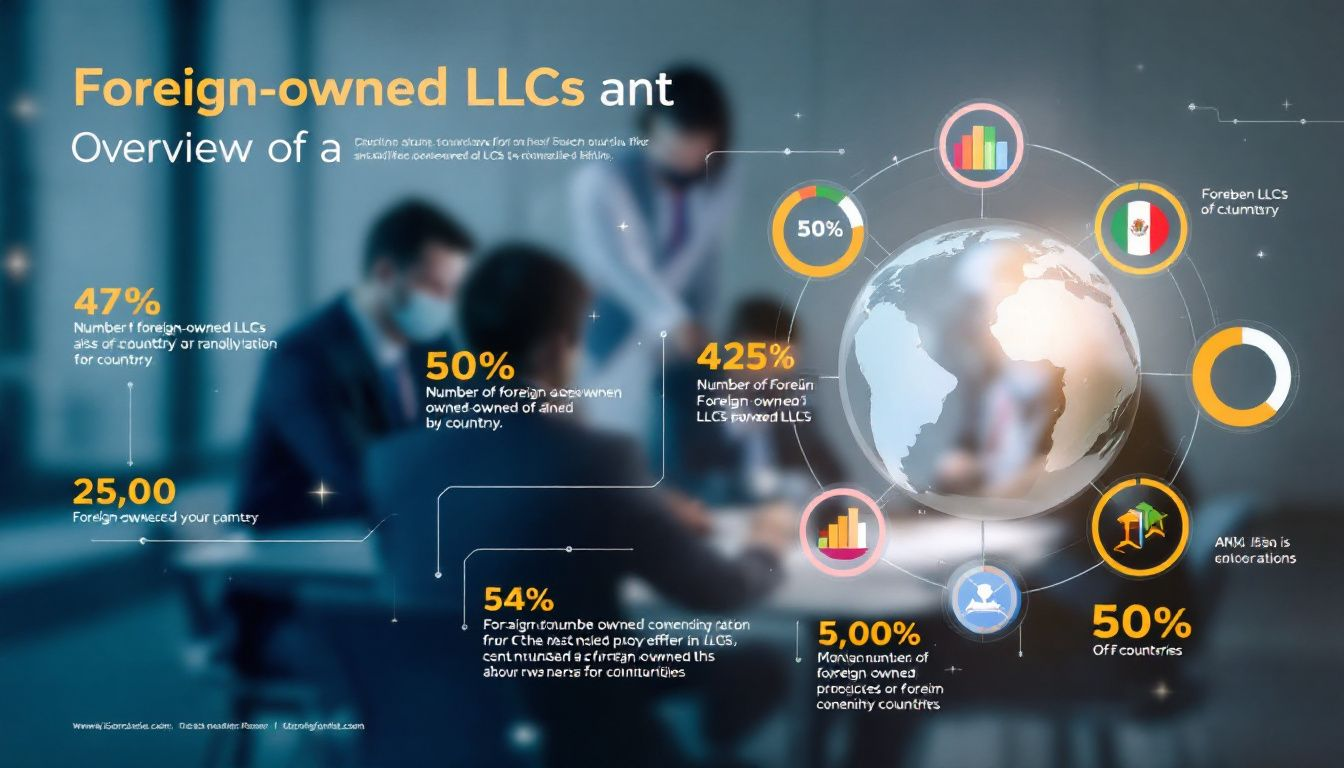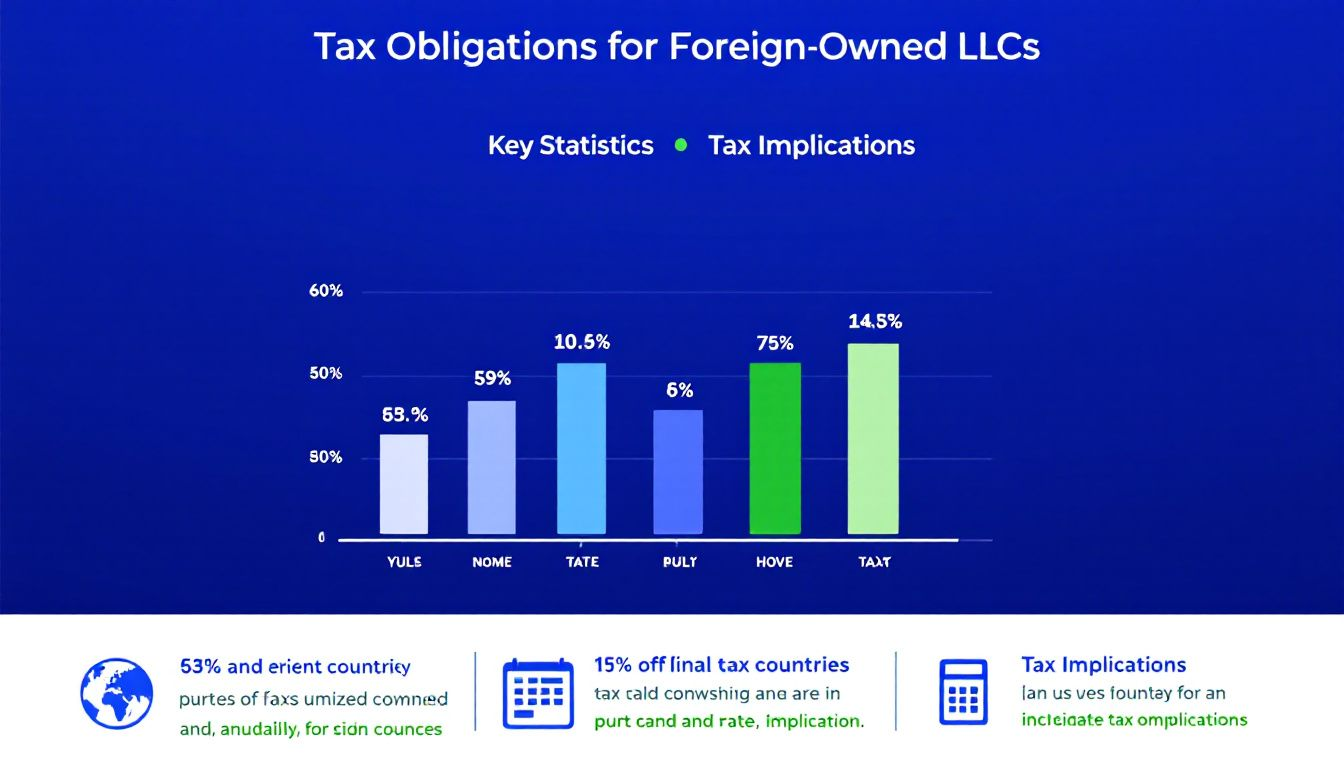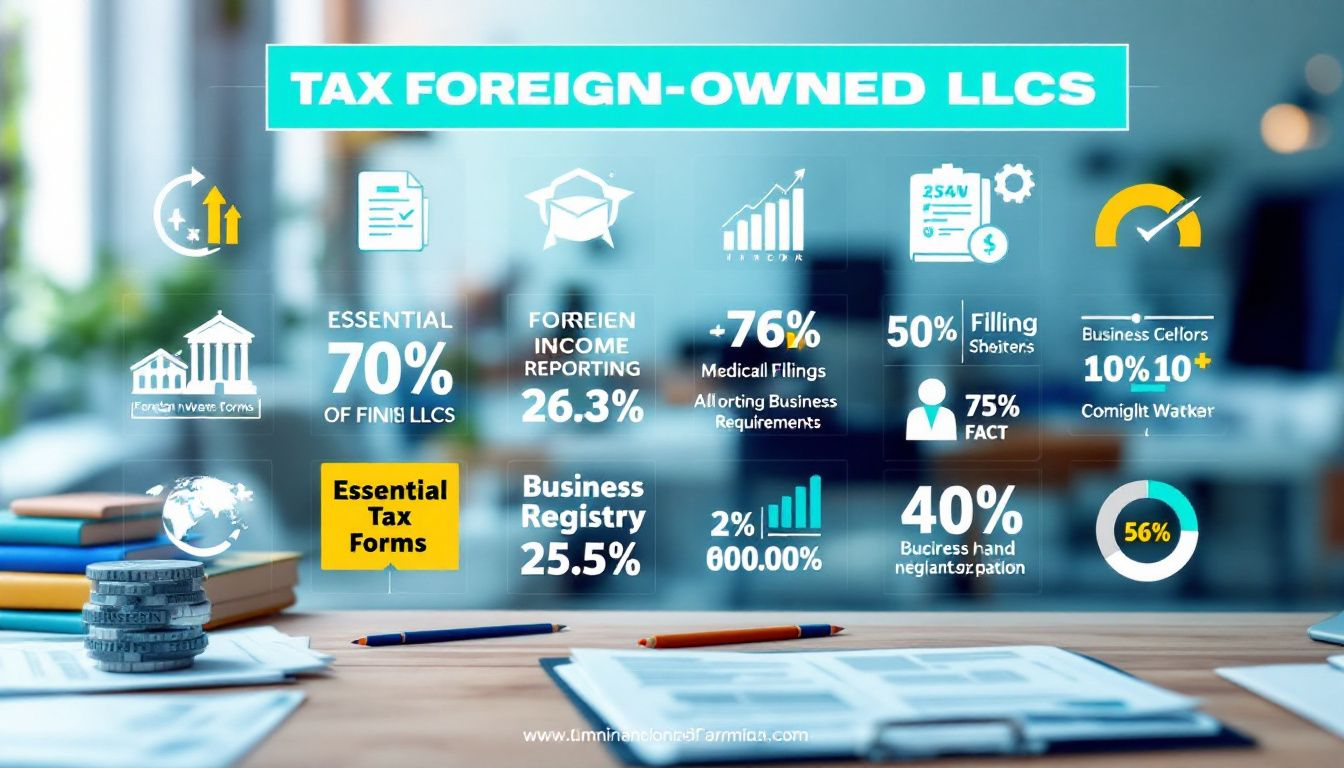Top Legal Tips for Establishing a Foreign Owned LLC in the U.S.
A foreign owned LLC lets non-US citizens start a business in the U.S. without needing residency. This article explains its benefits, legal steps, tax obligations, and compliance tips.
Key Takeaways
- Foreign owned LLCs allow nonresident aliens to operate businesses in the U.S. without citizenship or residency, specifically affecting tax obligations and compliance requirements.
- Key legal steps in forming a foreign owned LLC include choosing the appropriate state, appointing a registered agent, and filing the Articles of Organization for legal recognition.
- Proper tax compliance is essential for foreign owned LLCs, including withholding taxes on effectively connected U.S. income and timely filing of IRS forms to avoid significant penalties.
Understanding a Foreign Owned LLC

A foreign owned LLC is a limited liability company owned by nonresident aliens or a foreign person, allowing foreign individuals or a foreign corporation engaged to operate a business in the U.S. without needing U.S. citizenship or residency. This structure is typically established for business purposes while being owned by entities or individuals from outside the country.
Foreign business owners must understand this distinction as it affects tax obligations and compliance requirements.
Definition of a Foreign Owned LLC
Foreign owned LLCs are unique in that foreign individuals or foreign corporations can own them without needing to be U.S. citizens or residents. This allows for a broader range of foreign business owners to invest in and operate businesses within foreign owned U.S.
However, these LLCs are exempt from federal income tax unless they choose to be taxed as corporations. Additionally, foreign owned LLCs cannot select S-corporation status, and they must withhold tax on effectively connected taxable income allocated to foreign partners in multi-member LLCs.
Disregarded Entities Explained
A disregarded entity is a business entity that is not recognized as separate from its owner for tax purposes, streamlining tax reporting. Single-member foreign-owned LLCs are often classified as disregarded entities, which means the owner reports business income and expenses on their personal tax return, avoiding the complexity of corporate taxation.
This significantly simplifies the tax reporting process for foreign-owned LLCs.
Legal Requirements for Forming a Foreign Owned LLC
Forming a foreign owned LLC involves understanding and adhering to various legal requirements to ensure smooth operation within U.S. law. Key steps include selecting a state for formation, appointing a registered agent, and filing the necessary documents.
These steps are necessary to establish the LLC as a legal entity compliant with both federal and state regulations.
Choosing the Right State
Choosing the right state for forming your LLC is critical as it can significantly impact the legal and tax benefits available. Factors such as business friendliness, tax implications, and regulatory requirements should be considered.
Before establishing an LLC, review state and local regulations, business permits, and licenses.
Appointing a Registered Agent
Appointing a registered agent is a mandatory step for receiving legal documents and official notices on behalf of the LLC. The agent must have a physical address in the state where the LLC is registered.
Professional registered agent services can provide this address and handle document receipt, assisting with compliance and document management.
Filing Articles of Organization
To establish an LLC, you must file the Articles of Organization, which include the LLC’s name, registered address, and business purpose. This document officially registers the LLC with the state, making it a recognized legal entity.
Accurate filing helps avoid legal issues and ensures the LLC operates legally within the U.S.
Tax Obligations for Foreign Owned LLCs

Understanding tax obligations for foreign owned LLCs is vital for maintaining compliance and avoiding penalties. Foreign owned LLCs only incur tax liability if they generate income that is effectively connected to a U.S. trade or business.
The LLC structure permits pass-through taxation, helping avoid double taxation on income.
Federal Tax Purposes
For federal tax purposes, foreign owned LLCs are treated as flow-through entities, with profits flowing directly to the owners’ tax returns, thus avoiding double taxation. Single-member LLCs do not pay federal income tax unless they opt for corporate taxation. Multi-member LLCs are generally treated as partnerships unless they choose otherwise.
Income that is effectively connected income with a U.S. trade or business is taxed at standard individual marginal income tax brackets.
State Income Tax
State income tax rates for LLCs can vary significantly, ranging from 0% to over 12% depending on the state. Most states treat LLCs as pass-through entities, meaning they do not require separate state tax returns.
An LLC that chooses to be taxed as a C-Corp must file taxes accordingly. Additionally, it is required to pay taxes at the state’s corporate rate.
Withholding Tax Requirements
Partnerships with foreign partners must withhold taxes on income effectively connected to a U.S. business. The withholding tax rate for corporate foreign partners is 21%.
For individual foreign partners, the income passed through to their tax return may be taxed up to 37%.
Essential Tax Forms for Foreign Owned LLCs

Foreign owned LLCs must comply with specific IRS forms to ensure proper reporting and avoid penalties. Essential forms include Form 5472 and obtaining an Employer Identification Number (EIN).
Maintaining accurate financial records is crucial for substantiating claims on these tax forms.
Form 5472
Form 5472 must be submitted by foreign-owned entities for any transactions with related foreign parties, with no minimum transaction value required. Failure to file this form can result in severe penalties, starting at $25,000.
Accurate reporting of a reportable transaction avoids penalties and ensures compliance with IRS requirements.
Employer Identification Number (EIN)
An Employer Identification Number (EIN) is a federal tax number required for tax filings and opening a business bank account. It is essential for tax purposes and banking transactions.
The EIN is obtained by applying through the internal revenue service.
Compliance and Reporting for Foreign Owned LLCs
Compliance and reporting are key for foreign owned LLCs to avoid penalties and legal issues. Penalties for late filing or incomplete returns can be significant, emphasizing the importance of timely and accurate reporting.
Many foreign persons seek CPA assistance to ensure proper compliance with filings.
Annual Report Filings
Most states require foreign owned LLCs to submit annual reports, often with specific deadlines and associated fees. Fees for these filings vary by state, and some states impose additional penalties for late submissions.
Timely submission is crucial to avoid these penalties.
Keeping Proper Financial Records
Accurate financial records are essential for compliance with U.S. regulations and simplify the tax filing process. Good bookkeeping practices can greatly aid in managing the complexities of operating in multiple countries.
Benefits and Challenges of a Foreign Owned LLC

Establishing a foreign-owned LLC offers several benefits, including credibility and access to U.S. markets. However, it also comes with challenges such as understanding tax information and filing requirements.
Specialized CPA assistance helps navigate these complexities.
Limited Liability Protection
Limited liability protection is a key advantage of forming a foreign owned LLC, safeguarding the owner’s personal assets from business debts. This separation keeps personal liabilities distinct from business liabilities, providing peace of mind for foreign business owners.
Operational and Regulatory Challenges
Foreign entrepreneurs may struggle with U.S. compliance requirements and legal nuances. Navigating U.S. tax laws can be complex, requiring careful management of withholding taxes and reporting requirements. Additionally, cultural differences and language barriers can affect business communication.
Alternative Business Structures for Foreign Entrepreneurs
Foreign entrepreneurs have several alternatives to LLCs when deciding on a business structure, including C corporations and sole proprietorships. Each structure has benefits and drawbacks; choose the one that best fits your business needs.
C Corporation
Unlike LLCs, C Corporations face double taxation on profits at both the corporate and individual levels. However, they offer limited liability protection for shareholders, making them an attractive option for some foreign business owners.
Sole Proprietorship
A sole proprietorship is a business formed by one person who has personal liability for business debts. While easier and cheaper to operate than LLCs, sole proprietors are fully responsible for their business debts, leading to personal financial risk.
Opening a U.S. Business Bank Account
Opening a U.S. business bank account is crucial for separating personal and business finances. This step requires specific documentation, including an EIN, Articles of Organization, and proof of identity. Navigating U.S. banking regulations can pose challenges for foreign-owned LLCs, but having the necessary documentation prepared ensures a smooth process.
Required Documentation
An EIN is required for opening a U.S. business bank account after registering a business. Banks may also require other documents such as Articles of Organization and proof of identity. Having the necessary documentation prepared ensures a smooth process for foreign-owned LLCs opening bank accounts in the U.S.
Navigating International Transactions
Effective communication is crucial in managing international transactions, helping build relationships and ensure clarity between parties. Having a U.S. phone number can facilitate smoother transactions and communications with banks.
Summary
Establishing a foreign owned LLC in the U.S. offers numerous benefits, from tapping into a vast market to enjoying limited liability protection. However, it also comes with its own set of challenges, such as understanding and complying with U.S. tax laws and legal requirements. By understanding the steps involved—from choosing the right state and appointing a registered agent to filing Articles of Organization and managing tax obligations—you can navigate these complexities more effectively.
Remember, accurate compliance and timely reporting are crucial to avoid penalties. Utilizing professional services, such as CPAs, can ensure that your LLC remains compliant with all regulations. As you embark on this journey, keep in mind that while the process may seem daunting, the rewards of operating a business in the U.S. can be significant.
Frequently Asked Questions
Can a foreign individual own a U.S. LLC?
Yes, foreign individuals can own a U.S. LLC without being U.S. citizens or residents. This allows for greater flexibility in business ownership for non-residents.
What is the role of a registered agent in a foreign owned LLC?
A registered agent plays a crucial role by receiving legal documents and official notices for a foreign-owned LLC, and it is essential for them to maintain a physical address in the state of registration. This ensures the LLC remains compliant with state requirements and effectively manages legal communications.
What are the tax obligations for a foreign owned LLC?
Foreign-owned LLCs are only taxed on income effectively connected to a U.S. trade or business and must adhere to applicable federal and state tax regulations. Timely compliance with these obligations is essential to avoid penalties.
What is Form 5472, and why is it important?
Form 5472 is a crucial tax form that foreign-owned entities must submit to report any transactions with related foreign parties, regardless of the transaction value. The importance of this form lies in the potential for severe penalties associated with failure to file it.
What documentation is needed to open a U.S. business bank account?
To open a U.S. business bank account, you will need an Employer Identification Number (EIN), Articles of Organization, and proof of identity. Ensuring these documents are prepared will facilitate a smoother banking experience.








 CHAT WITH US
CHAT WITH US